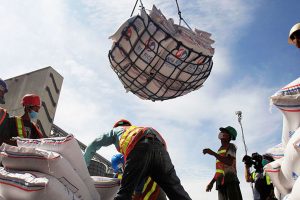THE GOVERNMENT needs to improve industry representation in the review of Executive Order (EO) No. 62, which cut the tariff on imported rice to 15%, an industry group said.
“In reviewing EO 62, we hope that farmers, seed growers, millers, wholesalers, retailers, and importers” can take part, Philippine Rice Industry Stakeholders Movement (PRISM) Founder and Lead Convenor Rowena D. Sadicon told reporters on the sidelines of a rice forum last week.
EO 62’s new tariff setting is in force until 2028, subject to review every four months in the event of changes to global prices and supply.
“On our side, the stakeholders, we cannot really question (EO 62) because there is a reason for it. But it’s probably the execution and the timing,” Ms. Sadicon added.
Industry and farmer groups have questioned the validity of the EO, claiming lack of public consultation.
Agriculture Secretary Francisco P. Tiu Laurel, Jr. had said that a fall to the P45 per kilo price level for rice may remain likely by mid-October if foreign exchange rates and world market rice prices remain stable.
PRISM Co-Founder Orlando Manutag said Vietnamese traders have begun canceling contracts of Philippine rice importers as prices rise in Vietnam.
The difference in the Philippine contract and the Vietnam market price is “around $60 to $70 per metric ton (MT),” Mr. Manutag added.
“Our importers in June didn’t buy rice because they were waiting for the lower tariffs. When the importers started to buy, Vietnam raised prices,” he said.
Vietnam supplies the majority of the Philippines’ rice imports, accounting for 75.88% of all shipments as of Aug. 8, according to the Bureau of Plant Industry. This was equivalent to 1.95 million MT, in the year to date.
“The government should intercede in this matter,” he added.
In January, the Philippines and Vietnam signed an agreement giving the Philippines a quota of between 1.5 and 2 million MT (MMT) of rice annually for five years.
Earlier, the US Department of Agriculture lowered its Philippine rice import forecast to 4.6 MMT this year due to weaker-than-expected purchases from Vietnam. — Adrian H. Halili

